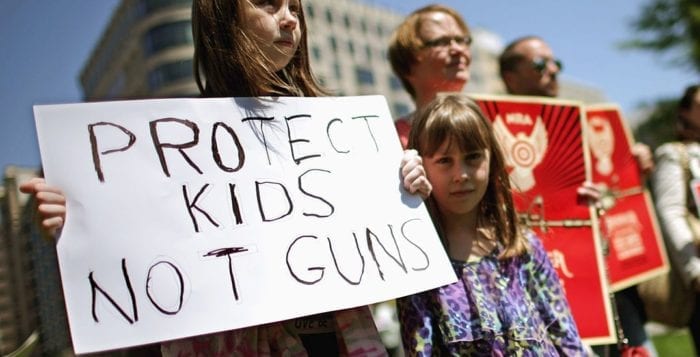Making Democracy Work: Curb gun violence with common sense legislative solutions
By Nancy Marr
According to the Gun Violence Archive, the number of mass shootings during 2018 in the United States has been estimated at 346, with 18 of them in schools. But laws backed by the NRA and other pro-gun groups prevent the public from seeing which firearms dealers are selling the most guns used in crimes, information the federal government collects but won’t share, even with premier research universities. The NRA also pushed through rules that had a chilling effect on federal studies focused on how guns affect public health, denying policymakers a road map for better gun laws.
Regulating the ownership and use of guns by the federal government began in the 1920s and ’30s with support from the general public and the NRA, then a sporting and hunting association. Since then the federal government and the states have passed legislation requiring background checks, waiting periods, licenses for concealed weapons carriers, restrictions on purchases for certain high-risk people and a ban on assault weapons and ammunition.
The 1993 Brady Act, against NRA opposition, tightened the background check requirements and created the FBI National Instant Criminal Background Check System, or NICS system, to provide speedy background checks. After the shooting at Sandy Hook governments turned their attention to preventing shootings by high-risk people.
New York State passed the SAFE Act (Secure Ammunition and Firearms Enforcement Act), amending its Mental Hygiene Law to add a new reporting requirement that mental health professionals currently providing treatment services to an individual must make a report to authorities, “if they conclude that the individual is likely to engage in conduct that would result in serious harm to self or others.” The act requires those who live with a household member “who has been convicted of a felony or domestic violence crime, has been involuntarily committed, or is currently under an order of protection” to “safely store” and lock any guns in a secure gun cabinet.
NRA opponents of the regulations state that the laws only hurt people who adhere to current firearms laws, and the regulations about gun locking devices prevent gun owners from using their guns in self-defense.
The League of Women Voters of the United States has been in support of stricter laws for background checks, more gun safety education, a ban on assault weapons and protection for victims of domestic violence from abusers who possess guns. The LWV of New York supported legislation to establish criminal sanctions for possession and sale of assault weapons, which were banned in 1994 but released from the ban in 2004.
Currently, on both the federal and state levels, there are laws that are being considered during this session that would deal with many of the loopholes and problems of illegal firearm use.
On the federal level, proposed legislation this term includes: requiring unlicensed sellers to meet their buyers (with certain exceptions) at a licensed gun dealer who would run a background check using the same process used for his own inventory, support for a ban on assault weapons, broadening the definition of domestic abusers to the laws protecting victims of domestic violence and opposing a national bill that allows people to carry concealed weapons.
On the NYS level, in January the Assembly and the Senate passed six important gun control bills related to an extreme risk protection order (ERPO/“red flag”) law, background checks extension, a bump stock ban, a ban on arming educators, out-of-state mental health records check and gun buyback programs. In February we hope that Gov. Andrew Cuomo (D) signs these bills, and that the needed regulations are written and appropriate funding allocated.
Contact your U.S. representative and NYS senator and Assembly member to find out how they voted or plan to vote, and what they think of these bills. Thank them if they did vote for those you care about, and clearly communicate your concerns and advocacy when they did not. For more information, go to the Senate or Assembly websites to research details on the individual bills or check with individual congressional or NYS legislative aides via phone or email. Make your voice heard on this important issue.
Nancy Marr is first vice president of the League of Women Voters of Suffolk County, a nonprofit, nonpartisan organization that encourages the informed and active participation of citizens in government and influences public policy through education and advocacy. For more information, visit www.lwv-suffolkcounty.org or call 631-862-6860.







